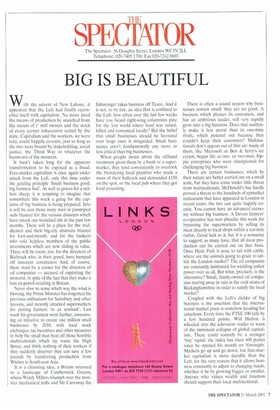BIG IS BEAUTIFUL
With the advent of New Labour, it appeared that the Left had finally reconciled itself with capitalism. No more need the means of production be snatched from the snouts of t. mill owners and the stock of every corner tobacconist seized by the state. Capitalism and the workers, we were told, could happily co-exist, just so long as the two were bound by stakeholding, social justice, the Third Way or whatever the buzzword of the moment.
It hasn't taken long for the apparent transformation to be exposed as a fraud. Free-market capitalism is once again under attack from the Left, only this time under the guiding principle 'Small business good, big business bad'. As well as graves for a million sheep, it is tempting to imagine that somewhere this week a gulag for the captains of big business is being prepared. Into it will be cast those nasty men in pinstriped suits blamed for the various disasters which have struck our wretched isle in the past few months. There will be a place for the middlemen and their big-city abattoirs blamed for foot-and-mouth, and for the bankers who sold helpless members of the public investments which are now sliding in value. There will be room, too, for the directors of Railtrack who, in their greed, have bumped off innocent commuters And, of course, there must be a corner for the directors of oil companies — accused of exploiting the motorist, in spite of the fact that they make a loss on petrol-retailing in Britain.
Never slow to sense which way the wind is blowing, the Prime Minister has forgotten his previous enthusiasm for Sainsbury and other tycoons, and recently attacked supermarkets for putting farmers 'in an armlock'. Last week his government went further, announcing an initiative to create one million small businesses by 2010, with local stock exchanges, tax incentives and other measures to help the small man beat off those horrible multinationals which lay waste the High Street, and think nothing of their workers if they suddenly discover they can save a few pounds by transferring production from Widnes to South-east Asia.
It is a charming idea, a Britain returned to a landscape of Cambeiwick Greens, where Windy Millers triumph over the monster mechanical mills and Mr Carroway the
fishmonger takes business off Tesco. And it is not, to be fair, an idea that is confined to the Left; how often over the last few weeks have you heard right-wing columnists pine for the lost world where food was raised, killed and consumed locally? But the belief that small businesses should be favoured over large ones is misguided. Small businesses aren't fundamentally any more or less ethical than big businesses.
When people moan about the offhand treatment given them by a bank or a supermarket, they tend conveniently to overlook the blundering local plumber who made a mess of their ballcock and demanded £150 on the spot, or the local pub where they got food poiconing. There is often a sound reason why businesses remain small: they are no good. A business which pleases its customers, and has an ambitious leader, will very rapidly grow into a big business. Does that suddenly make it less moral than its one-time rivals, which petered out because they couldn't keep their customers? Multinationals don't appear out of thin air: many of them, like Microsoft or Ben & Jerry's ice cream, began life as oneor two-man, hippie enterprises who were championed for challenging big business.
There are certain businesses, which by their nature are better carried out on a small scale, but they have come under little threat from multinationals. McDonald's has hardly proved a threat to the hundreds of upmarket restaurants that have appeared in London in recent years: the two can quite happily coexist. You cannot have an advanced economy without big business. A Devon farmers' co-operative has won plaudits this week for bypassing the supermarkets by selling its meat directly to local shops within a ten-mile radius. Good luck to it, but it is a nonsense to suggest, as many have, that all meat production can be carried out on that basis. Once Hyde Park is nose to tail with cattle, where are the animals going to graze to satisfy the London market? The oil companies are constantly lambasted for wielding unfair power over us all. But what, precisely, is the alternative? Small, family-owned oil companies tearing away in vain at the rock strata of Buckinghamshire in order to satisfy the local market?
Coupled with the Left's dislike of big business is the assertion that the international market place is somehow heading for cataclysm. Every time the FTSE 100 falls by a few hundred points, Will Hutton is wheeled into the television studio to warn of the imminent collapse of global capitalism. There could scarcely be a stronger 'buy' signal: the index has risen 400 points since he opened his mouth on Newsnight. Markets go up and go down, but free-market capitalism is more durable than the Left, for the very reason that it allows business constantly to adjust to changing needs, whether it be by growing bigger or smaller. Anyone who values wealth and freedom should support their local multinational.


























































































 Previous page
Previous page